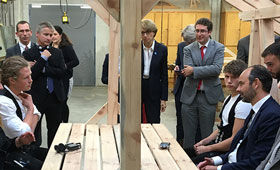France displays considerable interest in dual vocational education and training
French Prime Minister Édouard Philippe in Berlin
During the course of his official trip to Germany, French Prime Minister Édouard Philippe took the opportunity to visit the Upper Secondary School Centre for Construction Engineering at the Knobelsdorff School in Berlin. Prof. Dr. Hubert Ertl, BIBB’s Director of Research, was on hand to provide information about the dual system of vocational education and training in Germany.

France is seeking to reform its training system. Its endeavours in this regard are aligned to the German dual VET system, which is considered to be a successful model the world over. During a visit to the Upper Secondary School Centre for Construction Engineering at the Knobelsdorff School in Berlin, French Prime Minister Édouard Philippe was able to obtain detailed information about vocational education and training in Germany.
After a tour of the school’s training workshops, his agenda included discussions with trainees and a round table debate on dual VET.
During his talks with the Prime Minister, Prof. Dr. Hubert Ertl, Director of Research at the Federal Institute for Vocational Education and Training (BIBB), stressed that Germany’s low rate of youth unemployment was in no small measure due to its effective VET system. The German approach to vocational education and training also offered good career chances to those completing a qualification.
“Policy makers, trade and industry and the social partners all work closely together to shape and steer vocational education and training,” said Professor Ertl. He stated that the establishment of consensus was the lifeblood of the dual VET system and that this was one of the reasons why Germany achieved such success in this field.

Elke Hannack from the German Confederation of Trade Unions (DGB), Dr. Irene Seling from the Federal Association of German Employer Associations (BDA) and Bernd Becking from the Federal Employment Agency followed up by explaining the role played by the social partners and the employment agencies within the dual system.
In the subsequent debate, Professor Ertl was able to respond directly to the queries raised by Prime Minister Philippe regarding the transferability of characteristics of German VET to the French reform discussions. He emphasised that many of the factors that had led to success in the German context had been created over a long period of time and had been vitally informed by the research and development carried out by BIBB.
Franco-German cooperation in VET is based on cooperation that goes back many years. The final declaration which emerged from a conference staged by the German-French Council of Ministers in July 2017 accorded very prominent treatment to the topic of education. In the field of vocational education and training, particular collaboration is taking place in the area of “energy transition” (including energy-efficient construction) and with regard to mobility measures. BIBB is a member of the Franco-German Expert Commission on cooperation in vocational education and training.
It has also had a cooperation agreement in place with its French partner institute Centre d'études et de recherches sur les qualifications (CÉREQ) since as long ago as 1990. In France, CÉREQ undertakes research and statistical investigations into vocational education and training and the labour market. Its main focus lies in the area of continuing training with a particular emphasis on the topics of access opportunities, the continuing training market and company-based continuing training. The partnership agreement between BIBB and CÉREQ was renewed in 2016. The aim of this enhanced cooperation is to enable German and French input to support European vocational education and training.